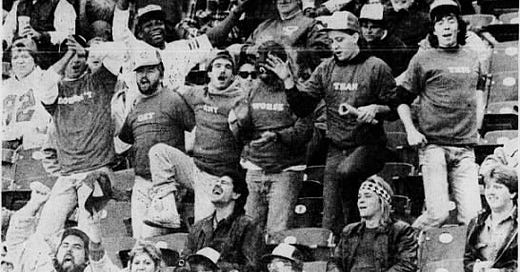Fans Disguised As Empty Seats (November 1955 and October 1987)
If games are played in an empty stadium, is anyone there to see them?
Welcome to Throwbacks, a weekly-ish newsletter by Michael Weinreb about sports history, culture and politics.

I. Dotting the Why
I have a running joke with a friend of mine that went public last fall, when we were both interviewed for ESPN’s series of documentaries on the 150th anniversary of college football: I once told him a top-tier college marching band affords the home team (roughly) a three-point advantage. He responded by assuring me that I am utterly insane. Agree to disagree, etc.
I have no way of demonstrating that my theory is empirically true, but here’s the thing about it, now that we live in a post-truth world: He has no way of proving that it isn’t true. No one, not even the analytic wonks, have been able to determine why home-field advantage is a thing, but they all acknowledge that it is a thing, so why couldn’t a few especially competent clarinet players make the difference between winning and losing?
Keep reading with a 7-day free trial
Subscribe to Throwbacks: A Newsletter About Sports History and Culture to keep reading this post and get 7 days of free access to the full post archives.



